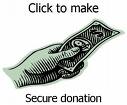 Printer-friendly version
Printer-friendly version Send to friend
Send to friend PDF version
PDF version
Can You Know If your Kid is Using Drugs?
There are many signs, both physical and behavioral, that indicate drug use. Each drug has its own unique manifestations but there are some general indications that a person is using drugs.
- Sudden change in behavior.
- Mood swings-irritable and grumpy and then suddenly happy and bright.
- Withdrawal from family members.
- Careless about personal grooming.
- Loss of interest in hobbies, sports, and other favorite activities.
- Changed sleeping pattern; up at night and sleeps during the day.
- Red or glassy eyes
- Sniffly or runny nose
The following are some of the signs and symptoms of specific drug use:
Methamphetamines: "Wired," sleeplessness for days and weeks at a time, total loss of appetite, extreme weight loss, dilated pupils, excited, talkative, deluded sense of power, paranoia, depression, loss of control, nervousness, unusual sweating, shaking, anxiety, hallucinations, aggression, violence, dizziness, mood changes, blurred vision, mental confusion, agitation.
Cocaine: Impaired thinking, confused, anxious, depressed, short tempered, panic attacks, suspiciousness, dilated pupils, sleeplessness, loss of appetite, decreased sexual drive, restlessness, irritability, very talkative, scratching, hallucinations, paranoia.
LSD (Acid): Dilated pupils, skin discoloration, loss of coordination, false sense of power, euphoria, distortion of time and space, hallucinations, confusion, paranoia, nausea, vomiting, loss of control, anxiety, panic, helplessness, and self destructive behavior.
PCP: Sometimes violent or bizarre behavior, suicide has often occurred, paranoia, fearfulness, anxiety, aggressive or withdrawn, skin flushing, sweating, dizziness, total numbness, and impaired perceptions.
Inhalants: Short-lasting euphoria, giggling, silliness, dizziness. Then come the headaches and full-blown "faintings" or going unconscious. Long term Use: Short-term memory loss, emotional instability, impairment of reasoning, slurred speech, clumsy staggering gait, eye flutter, tremors, hearing loss, loss of sense of smell, and escalating stages of brain atrophy. Sometimes these serious long term effects are reversible with body detoxification and nutritional therapy; sometimes the brain damage is irreversible or only partially reversible.
Heroin: Chemically enforced euphoria. "Nodding," which is a dreamlike state, near sleep, drifting off for minutes or hours. For long time abusers heroin may act like a stimulant and they can do a normal daily routine; however, for others, it leaves them completely powerless to do anything.
Marijuana: Compulsive eating, bloodshot red eyes that are squinty (they may have trouble keeping them open), dry mouth, excessive and uncontrollable laughter, forgetfulness, short term memory loss, extreme lethargy, delayed motor skills, occasional paranoia, hallucinations, laziness, lack of motivation, stupidity, sickly sweet smell on body, hair, and clothes, and strong mood changes and behaviors when the person is "high".
Depressants (Tranquilizers and Barbituates): Decreased inhibition, slowed motor coordination, lethargy, relaxed muscles, staggering gait, poor judgment, slow, uncertain reflexes, disorientation, and slurred speech.
What kind of activities are doing the foundation in order to eradicate this problem?
The Foundation for a Drug Dree World is active in more than 80 countries worldwide. It is distributing thousands of booklets The Truth About Drugs in community events, schools, to educators, and more.
Recently The Foundation for a Drug Free World participated to a baseball game . The Drug Free Marshals read the Pledge to live a drug free life to the 4.000 participants and distributed over 2.000 informative booklets.
Representatives from the Foundation for a Drug Free World also participated in many events around the world.
And the Foundation gives lectures in schools to youth, cooperates with educators, Crime Watch associations in order to make a difference regarding the problem of drugs.
For more information on the truth about drugs go to: www.drugfreeworld.org.
And for the person with a drug problem, there are real solutions to addiction. Narconon, a drug rehabilitation program that utilizes the methods of L. Ron Hubbard, has a success rate of more than 75% (www.narconon.org).
The best solution, however, is not to begin using drugs in the first place.




